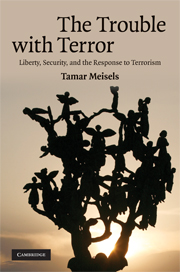Book contents
7 - Torture and the problem of dirty hands
Published online by Cambridge University Press: 04 August 2010
Summary
It is widely agreed among liberals that torture is a moral wrong, even within a just war, as it is particularly degrading and humiliating even in comparison with actual killing. As we saw in Chapter 6, there is some disagreement among philosophers as to the characterization of the precise evil that is torture and regarding the limits of its prohibition. I argued that torture ought to be categorically prohibited by liberal democracies, even in the course of confronting ruthless and unscrupulous terrorists. The rise of international terrorism has brought forth the suggestion that liberal democracies may actually be justified in resorting to the use of torture against captured terrorists in order to obtain life-saving information. We saw that amongst academics such suggestions usually take a standard form of presenting a vivid example in which the torture of a known terrorist is pitted against the prospect of saving many innocent lives from violent death by terror. The inevitable outcome, either implied or explicitly argued for, is a consequentialist, or semi-consequentialist, justification of specific acts of torture under certain, usually extreme, assumptions in which the outstanding suffering for many is taken to outweigh the suffering of the victim of torture. Thus the issue is supposedly resolved with a clear conscience and the alternative is presented as morally untenable. I remained uneasy about regarding torture as morally justifiable under any conditions and argued in favor of an absolute ban on torture.
- Type
- Chapter
- Information
- The Trouble with TerrorLiberty, Security and the Response to Terrorism, pp. 196 - 227Publisher: Cambridge University PressPrint publication year: 2008

